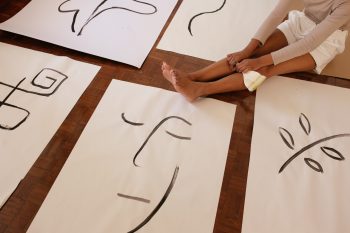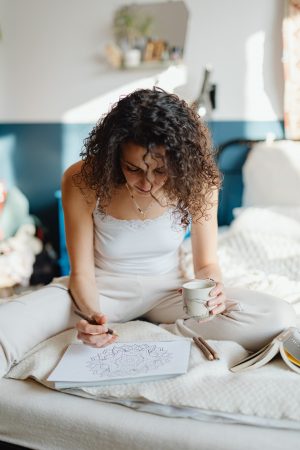There’s a lot we can do at home to help ourselves heal. In medicine, there’s movement away from prescribing drugs. Instead, patients are now encouraged to be more active, creative and social – because ultimately, it’s better for our health.
In fact, ‘social prescribing’ could cut visits to the GP and ER by a quarter, found the University of Westminster.
“Regulated arts therapies are being recognised as an effective treatment for mental health issues, such as depression and anxiety, as well as more severe mental health problems,” says Stephen Buckley from mental health charity Mind.
Would you give healing through art therapy a go? Here’s how to diversify your downtime to nurture both mind and body with your creativity…
Sing your heart out
Singing not only lifts your spirits, it increases aerobic activity, raising your heart rate and boosting the flow of oxygen around the body. It has also been linked to improved immunity, stress reduction, better pain management and longevity, says Heart Research UK. You don’t even have to sing in tune!

Singing in a group is even better, as it promotes a sense of belonging and purpose. Researchers at the University of Gothenburg found that choir singing made heartbeats synchronise, bringing about a relaxing effect. It affects heart- rate variability, which is linked to a reduced risk of heart disease.
“Song is a form of regular, controlled breathing,” says Dr Björn Vickhoff, the study’s lead. “It gives you pretty much the same effect as yoga breathing.”
Free your creativity
“Doing something creative is proven to be a great stress relief,” says Irene Ruby, founder of makingsandmusings.com. “It stimulates the brain to produce oxytocin, the feel-good hormone, after just 20 minutes.”
Creating something also gives you a sense of pride, which boosts positivity. Just don’t put pressure on yourself, as it’s important to have fun – low stakes, no stress. Give one of these a go.

Pexels
Paint a picture
A study by America’s Drexel University found that creating artwork, such as a drawing or collage – whatever your skill level may be – reduces levels of the stress hormone cortisol.
ALSO SEE: How to host a sip and paint party
Colouring
Already tried the adult colouring craze? It’s been big news for a while – and for good reason. Research revealed that daily colouring can help depression symptoms and anxiety after just one week.

Pexels
Write a story
“Writing things down helps us identify and clarify what we’re thinking and feeling,” says writing-for- wellness practitioner Jo Bisseker Bar. “It has an amazing way of getting at what sits just under the surface.”
Challenge yourself
Rather than passive pursuits, such as watching television, more active, hands- on forms of recreation, such as baking, cooking and crafting, are better for your mental health, as they often induce a meditative ‘flow state’.
“This is a state of total engagement, when you’re fully absorbed in what you’re doing,” explains positivity psychologist Miriam Akhtar. “You may also refer to it as being “in the zone”.”
But for even more benefits, you have to push yourself a little further. “You need to have a match of challenge and skill,
or slightly more challenge than skill,” says Miriam. “Too little challenge and it’s boring, while too much would make you more anxious.”
Learning a new skill may feel daunting at first, so join a group to keep motivated in the early, hard stages. If you’re skilled, level up experimenting with a new technique.

Pexels
The leisure pharmacy
More in the mood to pick up a leisurely hobby? Try these:
For stress and anxiety: Knitting
Knitting was identified as the most relaxing hobby in one study, which found the resting heart rate of participants, lowered by 18.75% to 65 bpm, on average. Fishing, blogging, calligraphy and painting followed closely.
For low self-esteem: Reading
Enjoy immersing yourself in a romance or love the pace of a thriller? A report by The Reading Agency revealed those who read more had increased self-esteem, empathy, and well-being, and reduced symptoms of depression, along with a lower dementia risk.
ALSO SEE: W&H reading nook. 5 cookbooks we’re loving
For low mood: gardening
As well as providing a full-body workout, research consistently shows that gardening boosts mood, and reduces anxiety, stress and depression. Being in nature is also a form of ecotherapy, which is now used as a social prescription to treat mental health problems.
ALSO SEE:
Feature Image: Pexels

